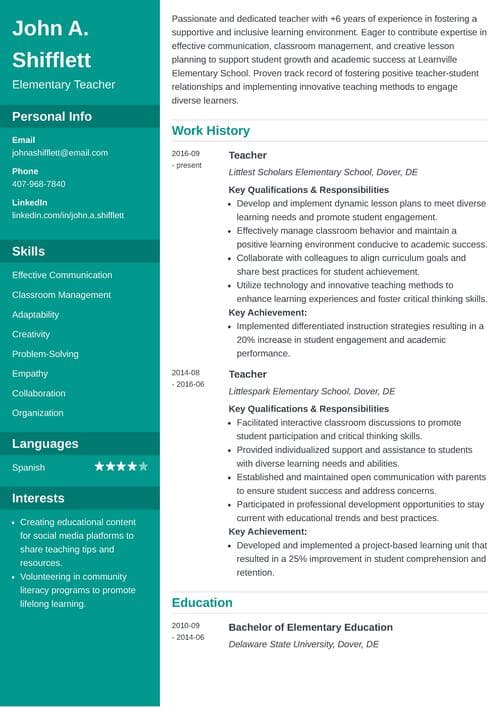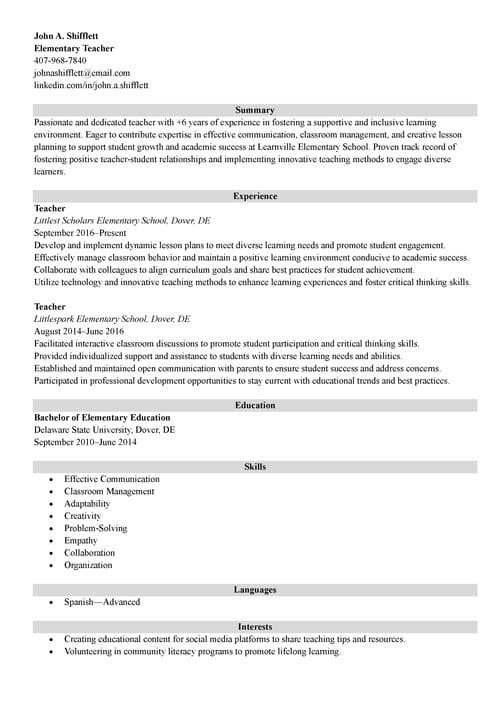From effective communication to classroom management, teacher skills are essential for a successful career in the education sector. In this guide, I'll analyze the key skills for a teacher's resume and share ideas on how to improve your teaching skills.
This guide will show you:
- The definition of teacher skills.
- What soft and hard skills do you need to be a great teacher.
- Different ways to improve teaching skills.
- How to add teacher skills to a resume to make it more effective.
Want to save time and have your resume ready in 5 minutes? Try our resume builder. It’s fast and easy to use. Plus, you’ll get ready-made content to add with one click. See 20+ resume templates and create your resume here.
Sample resume made with our builder—See more resume examples here.
Explore more related articles and gain valuable insights into the education sector:
- Teacher Resume Examples & Templates
- Teacher Cover Letter Examples + Templates
- English Teacher Resume Sample [+ Writing Tips]
- High School Teacher Resume Examples [+ Writing Tips]
- Education Resume Samples for Teaching Jobs
What Are Teacher Skills?
Teacher skills encompass a blend of interpersonal skills such as effective communication, creativity, and adaptability, with classroom management and subject knowledge, enabling educators to create engaging lessons, nurture student growth, and foster a positive learning environment.
Teacher skills contribute to a harmonious learning environment, enhancing student outcomes and school culture. School principals value teachers with versatile skills, as they can navigate diverse challenges, foster innovation, and create inclusive educational spaces. Plus, the skills of a teacher impact the students’ chances of getting to college, so they have a direct influence on pupils’ lives.
15 Teacher Skills for Your Resume
Skills are what makes a good teacher. There are many hard and soft skills needed to work in education, but I’ve carefully selected the 15 most essential ones. You can use them to identify areas where you can improve and as well as pick teacher skills to demonstrate on your resume.
1. Effective Communication
Mastering clear communication skills is essential for your teaching career. It involves conveying complex concepts, providing constructive feedback, and fostering student engagement. What’s more, effective communication extends beyond the classroom. It also involves interactions with parents and colleagues
In various situations, teachers apply effective communication skills, including:
- Parent-teacher conferences
- Explaining challenging concepts
- Collaborating with colleagues
2. Classroom Management
You can maintain a positive learning environment by balancing discipline and encouragement. Implementing effective classroom management strategies are crucial for successful teaching, as it makes it easier for students to focus on their tasks. These strategies are not just about maintaining order and limiting distractions, but also about fostering a collaborative learning environment.
Teachers utilize classroom management skills in the following scenarios:
- Handling classroom distractions
- Resolving student conflicts
- Organizing group activities
3. Adaptability
In the ever-evolving field of education, adaptability in the workplace is key. Your goal should be to navigate diverse learning styles, technologies, and other unforeseen challenges. To showcase your adaptability skills, try to explore and integrate new teaching methods to enhance student engagement.
Adaptability skills are demonstrated by teachers in various situations, such as:
- Implementing new teaching methods
- Adapting to virtual learning
- Adjusting lesson plans
4. Creativity
It’s one of the most common transferable skills and injecting some of it into lessons significantly increases student interest. Think outside the box to create memorable and engaging educational experiences. Thanks to creativity, you can not only capture and maintain student interest but also enhance learning outcomes by making various concepts more relatable and enjoyable.
In practice, teachers employ creativity skills through activities such as:
- Designing interactive lessons
- Incorporating educational games
- Encouraging artistic expression
5. Problem-Solving
Quick thinking and problem-solving skills are crucial for addressing individual student needs, ensuring that each student has the support and resources necessary to succeed. Being able to efficiently find solutions to various problems allows you also to overcome various obstacles in the learning process
Teachers utilize problem-solving skills in various scenarios, including:
- Handling student learning gaps
- Resolving technical issues
- Adapting to unexpected challenges
6. Empathy
Understanding and empathizing are some of the interpersonal skills that are fundamental for creating an optimal learning environment. Aim to empathize with your students, so that you can effectively address the emotional and educational challenges that your students face—this will promote a sense of security and openness in the classroom.
Teachers demonstrate empathy through actions such as:
- Supporting students in distress
- Recognizing individual needs
- Creating inclusive spaces
7. Collaboration
Your ability to collaborate with colleagues, parents, and administrators enhances the overall educational experience and contributes to a positive school culture. Effective collaboration is about open communication, shared goals, and mutual respect. These elements are essential for creating a cooperative atmosphere.
Teachers engage in collaboration through activities such as:
- Participating in team meetings
- Engaging in parent-teacher partnerships
- Collaborating on school events
8. Organization
Effective organization skills are crucial for managing lesson plans, grading, and preparing classroom materials. This ability to create and maintain a well-organized learning environment enables smoother transitions between tasks and maximizes teaching time.
Teachers can demonstrate organization skills by:
- Managing multiple assignments
- Maintaining order in the classroom
- Planning long-term projects
9. Time Management
Efficient time management is crucial when you have to juggle various tasks. Planning your time in advance increases your productivity and reduces stress. By managing your work schedule, you can ensure that essential tasks such as lesson planning, grading, and administrative duties without compromising the quality of education.
Teachers employ time management skills by:
- Creating timely lesson plans
- Efficient grading practices
- Balancing administrative tasks
10. Classroom Innovation
Staying up to date with technological advancements and innovative teaching methods enhances the overall learning experience. Do your best to embrace new tools and techniques to keep students engaged. This commitment to innovation helps you to maintain student interest and facilitates more efficient learning by integrating modern technologies that cater to diverse learning styles.
Teachers can demonstrate classroom innovation through actions such as:
- Integrating educational apps
- Implementing virtual field trips
- Incorporating gamified learning
11. Cultural Competence
This essential soft skill enables you to effectively understand, respect, and integrate cultural differences into the learning environment. This in turn creates a more inclusive and welcoming atmosphere for all of your students.
Teachers exhibit cultural competence by:
- Celebrating cultural diversity
- Incorporating multicultural content
- Adapting teaching strategies for diverse learners
12. Conflict Resolution
Effectively handling conflicts is an indispensable interpersonal skill for any teacher. Whether mediating conflicts among students or between parents and teachers, conflict resolution is crucial for maintaining a constructive and positive atmosphere. Mastering various techniques allows you to efficiently address and defuse tensions, promoting understanding and cooperation.
Teachers can demonstrate conflict resolution skills by:
- Resolving student disputes
- Navigating parent-teacher concerns
- Fostering a collaborative classroom environment
13. Critical Thinking
Critical thinking is one of the key personal skills of any good teacher. It encourages critical thinking skills among students, which is vital for their academic and personal development. You can aim to create lessons that challenge students to analyze, evaluate, and synthesize information. This approach prepares students to confidently face real-world challenges.
Teachers foster critical thinking through activities such as:
- Designing thought-provoking assignments
- Encouraging analytical discussions
- Promoting independent problem-solving
14. Data Analysis
Utilizing data to assess student performance and make informed decisions is a valuable hard skill. By effectively utilizing data to assess student performance, you can tailor your teaching approach to meet the unique needs of each student. This can help you ensure that your preferred teaching strategies are not only based on theory but are also validated through actual student achievements and needs.
To enhance teaching effectiveness, educators often engage in data analysis tasks, such as:
- Analyzing assessment results
- Implementing data-driven instruction
- Monitoring student progress
15. Emotional Intelligence
Understanding and managing emotions is crucial in creating a positive and supportive learning environment. Emotional intelligence fosters teacher-student relationships in which students feel safe and valued.
Plus, teachers who help students improve non-cognitive skills like self-regulation enhance their academic performance and probability of graduating from high school more than teachers who help them improve standardized test results.
Teachers demonstrate emotional intelligence through actions such as:
- Recognizing and addressing emotional needs
- Building trust and rapport
- Modeling emotional regulation
Read more: What Are Employability Skills? Definition & List of Most In-Demand Examples
Making a resume with our builder is incredibly simple. Follow our step-by-step guide, use ready-made content tailored to your job and have a resume ready in minutes.
When you’re done, Zety’s resume builder will score your resume and our resume checker will tell you exactly how to make it better.
How to Improve Your Teaching Skills
Continuous improvement involves regularly updating and expanding the skills needed for teaching your students. Here are key tips to enhance your teacher skills:
Adopt the Mindset of a Constant Learner
Stay updated with the latest educational trends and teaching methodologies. You can do that by attending workshops, webinars, and professional development programs.
Embrace Peer Collaboration
Engage with your work colleagues to share insights, strategies, and experiences. Collaborative learning builds a supportive teaching community.
Develop Your Skills Online
The opportunities to improve your teaching skills are virtually limitless. For example, you can choose a Get Interactive: Practical Teaching with Technology course on Coursera, enroll in a course about Family Engagement in Education taught by Harvard University, explore learning opportunities available on the Teaching Channel platform, and more!
Ask for Student Feedback
Actively seek and value feedback from your students. Their perspectives provide valuable insights into your teaching style and potential areas for improvement.
Explore Technology Integration Opportunities
Embrace technology to enhance your teaching methods. Explore innovative tools and platforms to create engaging and interactive lessons.
Pro Tip: Regularly self-assess and reflect on your teaching practices to identify areas for improvement and growth.
Teacher Skills on a Resume
Showcasing your competencies on a resume is crucial for standing out in the competitive field of education. But It’s not only about which skills to put on a resume but also how to do it.
Best ways to add teacher skills to a resume include:
- Teacher Resume Skills Section—create a resume section just for your hard and soft teaching skills.
- Achievement Statements—add achievements proving your strengths to your resume profile and work experience section.
- Resume Tailoring—tailor your resume by picking skills that match the job ad.
Prepare for your dream teaching job interview with our guide: Most Common Teacher Interview Questions [+ Answers]
Plus, a great cover letter that matches your resume will give you an advantage over other candidates. You can write it in our cover letter builder here. Here's what it may look like:
See more cover letter templates and start writing.
Elevate your teaching career by mastering and showcasing the essential teacher skills I’ve talked about. Whether you're a seasoned educator or just starting, continuous development of these skills is the key to positively impacting your students' lives.
About Zety’s Editorial Process
This article has been reviewed by our editorial team to make sure it follows Zety's editorial guidelines. We’re committed to sharing our expertise and giving you trustworthy career advice tailored to your needs. High-quality content is what brings over 40 million readers to our site every year. But we don't stop there. Our team conducts original research to understand the job market better, and we pride ourselves on being quoted by top universities and prime media outlets from around the world.





